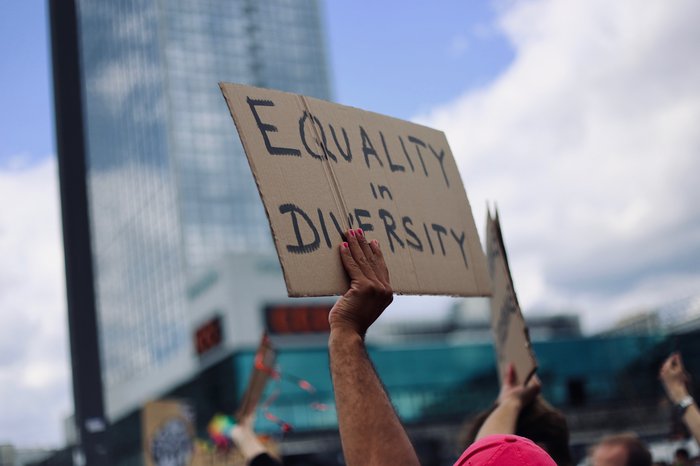Putting equality, diversity and inclusion at the heart of our mission

Blood cancer can affect anybody – whatever their age, skin colour or race, social background, disability, gender or sexual orientation.
But unfortunately, we know that not everybody’s experience of blood cancer is the same. And that there are deep rooted inequalities in treatment, experiences and outcomes.
We can’t succeed in our mission to beat blood cancer within the next thirty years, unless we do all that we can to identify and address these inequalities. This blog outlines some of the key priorities for us over the next year.
Our Equality, Diversity and Inclusion strategy: actions, not just words
Earlier this year we launched our organisational Equality, Diversity and Inclusion strategy. This is a starting point for us, rather than a destination. We’ll only make progress by approaching inclusion in the way that we do other organisational priorities: being guided by our community and people affected by blood cancer, and learning from our mistakes.
We are proud of the recent strides we have made in making Blood Cancer UK a more inclusive place to work, where everyone can progress and thrive. In particular, we have put in place a number of new recruitment processes, so that we can recruit the best people to come and be part of our Blood Cancer UK, including name blind shortlisting, involving people affected by blood cancer in recruitment, sharing questions before panel interviews and diversifying our board of trustees.
But there is more that we can do to use our voice and influence as the UK’s leading blood cancer charity, to address inequalities, through our research, policy and services. Does our mission help solve health inequalities and tackle the challenges that marginalised communities face? Do we even know the nature of those challenges?
Health inequalities in blood cancer: what we know and what we don’t know
Evidence of inequalities in blood cancer isn’t new. The Afro-Caribbean Leukaemia Trust and Anthony Nolan have long campaigned to increase the number of stem cell donors from ethnic minorities.
It is also clear that ethnic minority patients are less likely to be recruited into clinical trials in haemato-oncology, even in myeloma where incidence rates for both African and African Caribbean men and women are twice as high than in the white population. Recently, we produced a report with the University of Bath which summarises these challenges.
Our knowledge of the true extent of inequalities is patchy at best. For example, trials do not routinely publish results by race and ethnicity, so we do not know the full extent of the lack of representation in clinical research.
There is some evidence from other cancers, and from feedback from patients, that some people who are LGBTQ+ and some people from some ethnic minorities feeling excluded from the healthcare system, which can mean that they may be less likely to seek help and have a negative impact on their experience, and possibly outcomes.
Our understanding of the impact of inequalities on outcomes is inadequate. Previous research in 2011 by Blood Cancer UK showed that children with leukaemia from a less well off background, were 30% more likely to die than children from affluent backgrounds. Following that study, we identified a number of recommended changes, but we need to see data being routinely collected and analysed across the health and care system so that we can take action.
Leading change: what Blood Cancer UK is doing
As a small organisation, with a focused mission, within a hugely complex health and care system, we have reflected on where we can have most impact. We’ve identified a number of areas where we are committed to making progress, and feel that we can make a difference:
- Addressing gaps in our understanding of inequalities in blood cancer
Our starting point, has been a review of the data we collect internally. Our previous approach had limited our ability to monitor whether are services are not reaching some people affected by blood cancer. We have now developed a consistent framework, which means that we can more routinely monitor our service provision, and which addresses previous gaps in our knowledge, specifically ethnicity data.
We have also reviewed our policy and influencing programme, to identify ways in which we can address existing gaps in our knowledge, and also influence for change. For example, with the Blood Cancer Alliance, we have commissioned a report into the unmet needs of people from minority ethnic groups with blood cancer.
- Developing and designing services to support the diverse blood cancer community
We know from the limited evidence we have, and from evidence from other charities, that our services are more likely to be used by people who are white, older and better off. We need to do more to ensure that our services are as inclusive as possible and to broaden their reach.
Over the last 6 months, we have started to review and redevelop our health information. We have launched the first of these new products, Your Blood Cancer Diagnosis, What Happens Now? This has been developed with and for people affected by blood cancer. Now we are working on more health information, using the same model and we want this to be as inclusive as possible.
In parallel, we are reviewing our digital channels, particularly our website, to identify and implement improvements to the accessibility of our information, and support needs around visual impairments.
We’re also working closely with our network of blood cancer healthcare professionals, to look at how we can work together to reach groups and individuals that have been marginalised.
- Using our influences as a research funder
Every year we fund millions of pounds of research, focused on our goal to beat blood cancer. Earlier this year, we published our research strategy, which set out our next research priorities. This strategy was developed collaboratively with people affected by blood cancer, and we are committed to continuing to work in this way at every stage of our prioritisation and decision making, with a particular focus on ensuring we include the most diverse range of voices and experiences.
Beating blood cancer for everyone
These are not easy problems to overcome, nor will they be fixed overnight. As a charity, we don’t exist in a vacuum and addressing inequalities in research, and the experience and care of patients, will require change across the health and care system.
But we can play our part, and we must ensure that our work neither exacerbates health inequalities, nor shies away from tackling the challenges that underrepresented communities face. And we must do more to engage effectively and find out what those communities need from us.
Blood Cancer UK exists to save lives and bring about the day that blood cancer is defeated for good. Until that day comes, it is our duty to ensure that we reach everyone affected by blood cancer.

Talk to other people affected by blood cancer
Hear from and connect with people who understand.
